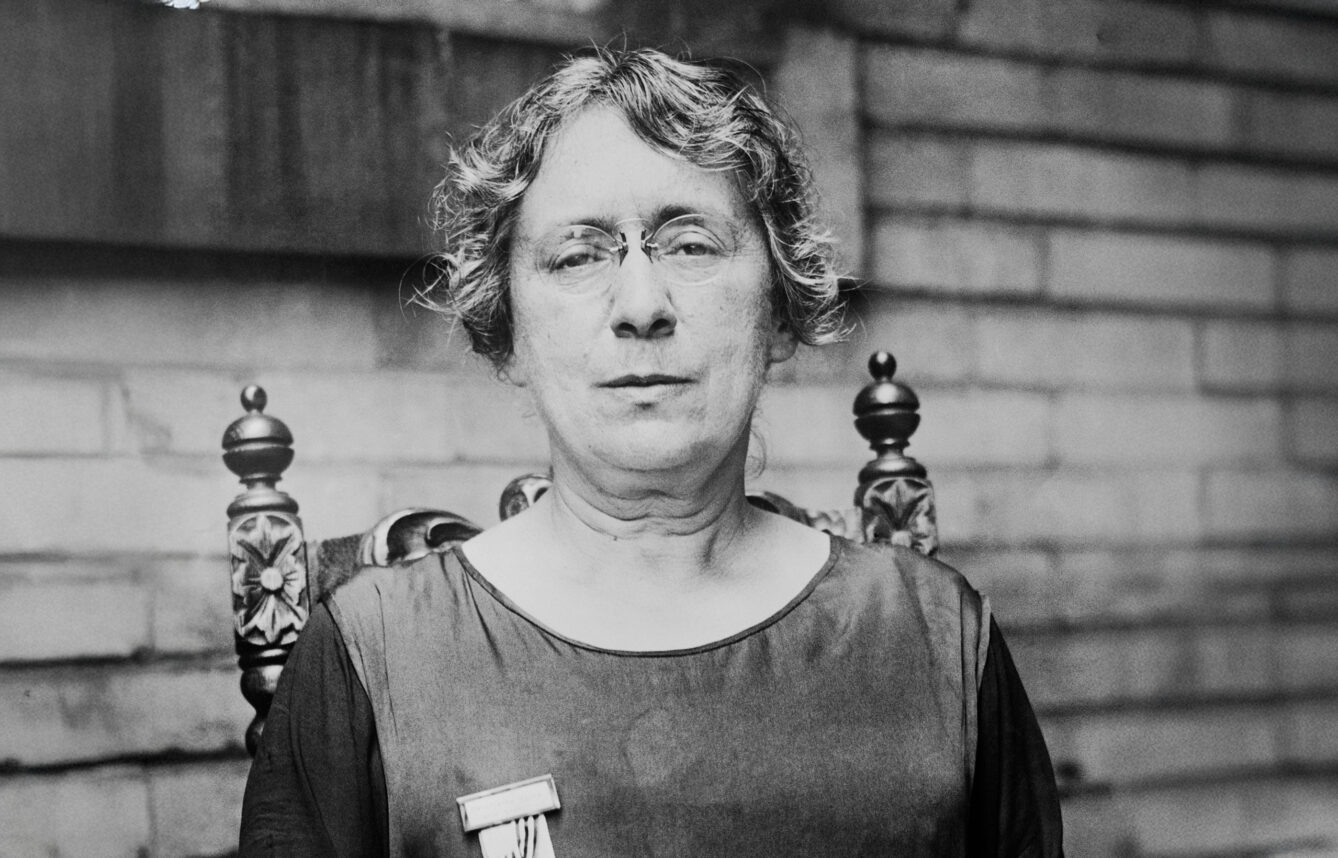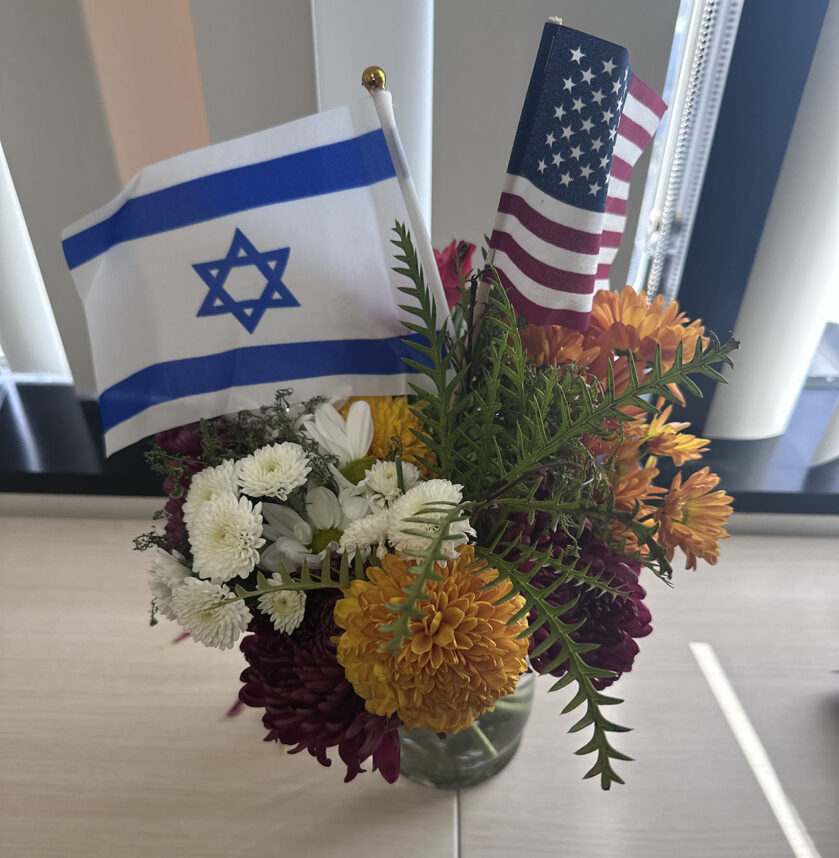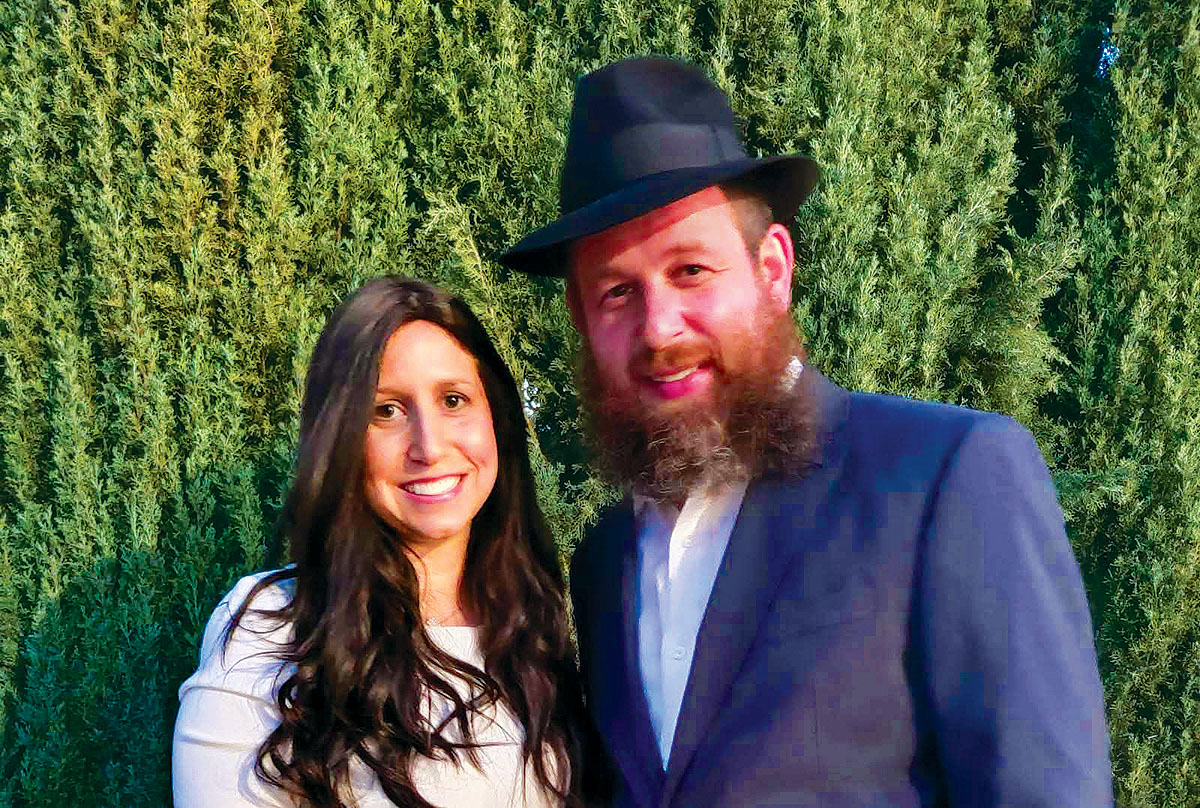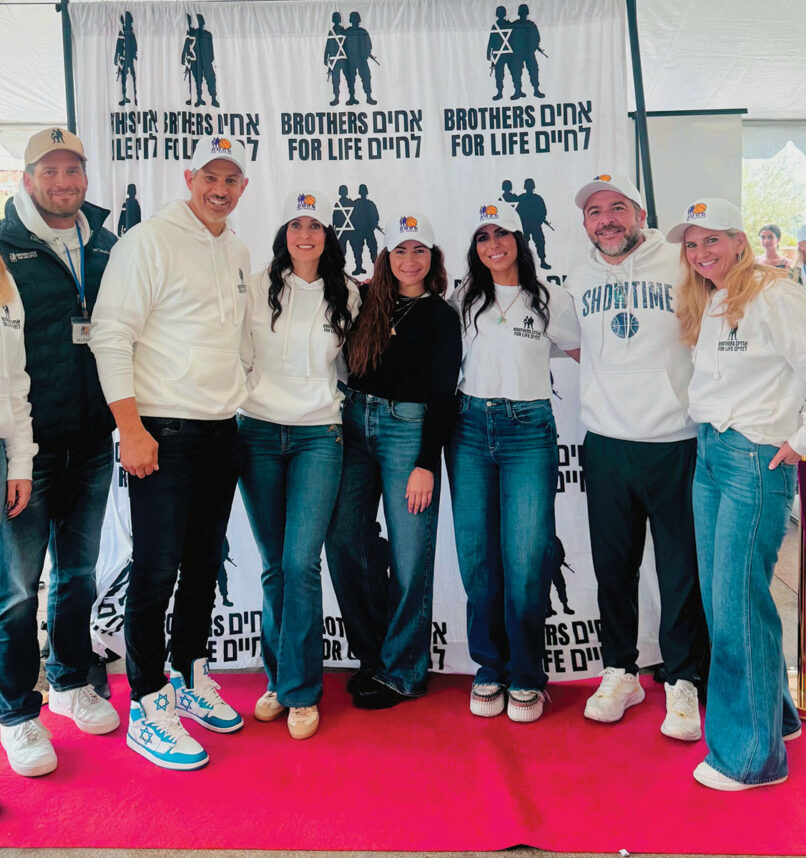Political analyst and Jewish Journal columnist Raphael Sonenshein interviewed California Assembly Speaker Karen Bass at the Jewish Journal offices on May 29, 2009, as California faces a dire budget crisis. She talks about her background growing up among Los Angeles’ Jewish community, her background in community organizing and her rise in California politics.
Raphael J. Sonenshein: Good morning, Speaker Karen Bass. So nice to have you here with us.
Karen Bass: Good to see you again.
RS: Good to see you too. Growing up in Los Angeles, you probably had a lot of contact with this part of town and the Jewish community. Can you tell us a little bit about it?
KB: Sure. Well, I was born and raised in LA, and I moved into the Venice-Fairfax area from the South Central area when I was 10 years old, and went to Hancock Park Elementary School, which was actually all Jewish. As a matter of fact, my first contact with the Jewish community was showing up at school for Yom Kippur and being the only person in my class, and that’s how I contacted the Jewish community. (laughter) But from Hancock Park Elementary School, I went to Hamilton High School, which was predominantly Jewish during those years.
Growing up in the Venice-Fairfax area, it was an area of activism where a lot of the parents of my friends were activists, either union activists or involved in different organizations. So the values that I treasure really were a result of watching the Civil Rights Movement on TV, talking to my father about what growing up in the South meant, and then growing up during the ’60s and watching young people try to change the world, led me to making a lifetime commitment to working for social and economic justice.
RS: And then you ended up back in South Central Los Angeles?
KB: Right. I chose to, professionally, by the way. I worked in the medical field, and that was my day job. My night job was being a community activist, but I never got paid for it, and in the ’80s I just became obsessed behind the whole crack cocaine epidemic and wanted to figure out a way to address the War on Drugs, because it was so obvious to me and others in the 1980s when we watched all of the drug laws being passed, that we would be right where we are today, with an over-concentration of people who are incarcerated. So I wanted to try to shift the agenda for the drug problem away from incarceration toward a more comprehensive public health viewpoint, which is viewing a drug problem as a health issue and as an economic issue. So I created Community Coalition. We were in the middle of a terrible gang crisis at the time, and I believed that the young gang members actually had a lot of leadership skills, they were just being driven in the wrong direction, and that if there was an outlet for their leadership then they would go in the right direction. So you take an adolescent, and one of the jobs of an adolescent is to rebel, and if you take that rebellion and channel it in a positive way, you can take that energy and then that energy becomes something that’s fighting for change versus rebelling with no direction.
RS: Right. You know, a lot of community organizers look down on elected politics, or say, “I’m never going to have anything to do with elected politics.”
KB: I did, too.
RS: I bet you did. (laughter) How did it happen that at one point you had that attitude, right?
KB: Right.
RS: But you also worked with a lot of elected officials in your community organizing. What made you think that maybe you might want to sit in that chair at some point?
KB: Well, I don’t think I ever did think I wanted to sit in the chair. I think it’s just as a person who’s committed to fighting for social change, you find at different points in time you fight for that change in different venues, and so to me at a certain point in time it was important to step into the electoral arena. But I definitely had to be pushed and prodded, because I was much more interested in getting other people elected than I was myself. But because of term limits there’s such a quick turnover that people at one point turned around to me and said now I needed to jump in, and specifically it was Miguel Contreras from the Los Angeles County Federation who really pushed. Diane Watson, Congresswoman Diane Watson, who told me that I had spent enough time in the community and that there were no African American women in the legislature and so I needed to go to Sacramento. We built this coalition of labor and community folks that was involved in elections, and so we were trying to impact various Propositions, from 209 to 184, which was three strikes, 187, various propositions, and so we had built an apparatus that could involve people and organize people around elections. So when it came to my own election, I had a great time. I mean, it was great to get all of the people that had always been involved. There were some interesting experiences along the way. One, because I was the only woman, and so that was kind of fun. I was running against Nate Holden.
RS: Right. (laughter)
KB: And that was fun. But the young folks that I had worked with did a lot of door knocking, and I did a lot of phone calling, and I had some interesting phone calls because when I talked to some people they would say, “Well, you know, these young folks came by, and they knocked on the door, and they were talking about why they should vote for (you).” But what impressed the voters was the fact that the young people knew me. They had worked with me, so they didn’t need a script. They could talk specifically about the work of the coalition and all that stuff. But one of the things I learned on the campaign trail was people knew the coalition but nobody knew me, and if you remember, I specifically didn’t believe in putting myself forward as an individual.
RS: Well, let me get… you show up in Sacramento now. What surprised you when you got up there or what did you think when you first showed up and spent your first few months just as a regular member of the assembly?
KB: Oh, it was a lot easier than I thought. I found it to be very welcoming, extremely welcoming. As a matter of fact, the welcome was so overwhelming to me, because I guess I had been the first African American woman in a long time, and people just came out like you wouldn’t believe and embraced me. And also, just the help that was everywhere. So I didn’t feel lost at all, because there’s just a lot of people around with tons of expertise. One of the things that I thought was interesting was that there are kind of low expectations in a way. For example, there are lobbyists who will give you legislation.
RS: Just hand you a piece of legislation, all ready to go, wrapped up?
KB: Well, more or less. And you don’t have to have an original agenda. (laughter)
KB: That, I found surprising, and because I was running in a safe district—my election was in March—I had until December to prepare. Since I had eight months to prepare, I spent time going up to Sacramento, finding out who the players were, who were the veterans, who were the people from the Willie Brown era, finding him, tracking him down, and making him talk to me. So by the time I went up there I felt very ready to be there.
RS: Now, your agenda, foster care was one of the top ones, right?
KB: Well, what I did, Raphe, in the eight months when I was waiting to go up, I tried to figure out what I wanted to accomplish by 2010, because I knew I had such a short period of time, and I tried to identify what issues to work on. I looked at foster care and realized when I looked over the legislative records of other people that foster care was one of the few issues you could get people on both sides of the aisle to agree on. And also that had been studied to death, so everybody knew what needed to be done, but it wasn’t an issue that generated a lot of political will and definitely had very little power. But what I did first was, again using a community organizing approach, is I established a statewide network of all folks that had been involved in foster care. I organized focus groups and community meetings and hearings up and down the state where people began to tell me what they wanted to see done legislatively, came up with about 25 pieces of legislation, created a select committee on foster care, and then I went to various members and I saw, you know, which pieces of legislation they wanted to carry, and then we put forward a comprehensive agenda on foster care. And one issue specifically that we had worked on at Community Coalition were relative caregivers, the grandmothers and all, and they were viewed very negatively, because in Sacramento people’s view is, well you messed up on your own kids, why would you take care of your grandkids properly. So that’s harsh, but that was …
RS: Because it’s a whole different story.
KB: Well, it gets said, “the apple doesn’t fall far from the tree,” those kind of things, and so I wanted to really change that perspective, so I organized a public hearing on relatives. We had about 300 grandmothers and aunties and uncles come up, and by the time we were done and they heard the real-life testimony, that had gone away. That perspective was gone, and relatives now are elevated a lot higher.
RS: How did you get to become a leader?
KB: I started off in the leadership. My first position was majority whip.
RS: Oh, and when did you become majority whip? How quickly did you become majority whip?
KB: On the first day I was sworn in.
RS: Now how did that happen?
KB: Speaker (Fabian) Nuñez wanted me to be a part of his leadership team and offered me the position of majority whip. It was interesting because everybody strives to be a committee chair. I didn’t want to chair a committee, because I wanted to do my own thing. I wanted to focus on an issue, not just a whole area. I actually love the floor, and the floor and the assembly is very chaotic, and I really like the floor. I still like the floor, so the first term I was majority whip, then I became majority leader, which then meant I was responsible for everything that happened on the floor. The whip works under the majority leader, and then became speaker in my third term.
RS: OK, so becoming speaker, what were the politics of that?
KB: Yeah, it was a battle, but it was another battle that I was pushed and prodded in. Speaker Nuñez really wanted part of his legacy to be helping the first African American woman become speaker, and then a number of my colleagues encouraged me to run. I actually was headed in another direction. I was going to run for the senate seat that I believed Mark [Ridley-Thomas] was going to vacate. I went and got the votes—this is really kind of a funny story, because I was packed, my bags were packed and I was ready to leave to go to Atlanta to meet with President Carter and Rosalyn Carter, something that I had wanted to do. And before I left to go to the airport, Fabian called me down to his office, and he said, “Well, how are the votes going?” I said, “It’s going fine.” I think I had close to about maybe 20 commitments, and I had another six or seven pending, and it took 25 votes to get the majority, and so he was like, “Oh, no, this is over. You’re not going anywhere.” And so we pulled the rest of the votes together that night, and then the next morning there was the election and the caucus, and then we had… so that was Feb. 28, and then the swearing in was May 13.
RS: Okay. So you become Speaker. Now this is a big difference.
KB: Well, you know, yeah. One of the reasons I was reluctant is because I was concerned about the budget, and at that time we knew we had a budget problem. I had no idea I was going to become Speaker when the national economy melts down. (laughter)
RS: What was Gov. Schwarzenegger’s style like when you first started dealing with him? What was your sense of working with him?
KB: It was fine. You know, the governor, he’s from L.A. He might be a Republican, but he’s an L.A. Republican, and he’s from the entertainment industry, so interacting with him was fine. What’s been funny to me is sitting in meetings with the legislative leaders and watching the Republicans interact with him. Because the two Republican leaders at the time, they were both from the Central Valley, and they kind of looked at him like he was from another planet, and he looked at them like they were from another planet. But for me, I could relate to him. I mean, he’s West LA.
RS: And that became an interesting dynamic as time went on.
RS: So now you become Speaker, and all hell breaks loose on the budget front, so you’re now part of the Big Five, as they call it.
KB: Right, as the only woman and the only woman of color.
KB: You know what plays out more in Sacramento than race dynamics, are gender. Sacramento is an extremely male environment, and I think that… I mean, the guys are fine with me, but let me just go backwards and tell you that when Fabian was deciding whether or not to choose me as majority leader, he said to me, “I just don’t know how the Republicans are going to interact with you because they’re all men.” I mean, there’s a couple of Republican women, but… I said, “Fabian, I’ll be fine.” Number one, I’m used to all-male environments, but I also knew that they probably had little, if any, history of interacting with an African American woman. So, you know, things are just very male-oriented, but I’ve found that people are not quite sure how to interact.
RS: So how do they interact? When they seem uncomfortable, how does it manifest itself?
KB:What they didn’t see was, they didn’t see how I was handling them, and so I think that the male legislators are a lot more competitive and a lot more individualistic. The female legislators are much more cooperative with each other. So the rap on me was as Speaker could I really be Speaker, because I’m being too nice and I don’t fight. I just believe very strongly that there’s ways of fighting that is not—what do I call it? You know, it’s not yelling and screaming and whooping and hollering. I call it the Tarzan style of leadership. (laughter) I’ll give you a couple of examples. Over this last budget fight, they would sit in the room, and they would talk about were there any jobs —this is the Republicans and the governor—we need jobs and we need to make sure that we have the infrastructure money, and blah blah blah… but all the jobs they were talking about was jobs that guys would do. And at one point I got up and said, “You know, you’re talking about you’re concerned about jobs, and you’re going to lay off teachers, healthcare folks, and human services workers, who are all women. And so if you’re going to talk about jobs, you’ve got to talk about jobs for both men and women.” And after that they stopped talking about jobs. (laughs)
RS: So before we go further into the budget, which I really want to go into, tell me about your style as Speaker in terms of going around the state and going to your members’ districts, and presumably even going in to visit some Republican members in their districts.
KB: When I harvested rice, it was with one of my Republican members who wanted me to go see. Well, I was asking him about rice, because when I would fly into Sacramento, I would see as you’re landing I would see these big fields of water, and I didn’t know if it was flooding, because we were having flooding at that time, or if it was rice farming. So we would talk about that, and so he wanted me to come and see the rice farm, and so I did. I went and spent the day with him and just had a fascinating time. But what I’ve tried to do as Speaker is I’ve tried to be a Speaker that really promotes and empowers my members, and so the way I’ve been doing that, for example, is I have—and I’m also trying to… what I’ve been doing is trying to challenge the culture in the capitol, because it’s a very individualistic culture, and it’s a culture where ours and the other house are in competition, which to me is strange since we’re all Democrats, and so when you’re tackling a global issue, one individual can’t do it.
RS: It was 24 hours after you were sworn in that the budget just went all to hell?
KB: Well, it was 24 hours after I was sworn in that the governor released his version of the budget, which had drastic cuts, and so I had to go into fight mode right after. What happened then is it took us forever to actually pass the budget, and then we went into this longest time in history before the budget was passed. Then the budget gets passed, and then that’s when the economy collapsed, because the budget was signed around September, and it was around September when everything fell out.
RS: Right, and then the stock market goes, and now you know you have a catastrophe on our hands, right?
KB: Well, yeah, but what I fought for in the fall was for people to not view California in isolation. This was a national problem. Unfortunately, a lot of times the way it gets written about, the only thing that gets written about is the dysfunction of California as opposed to the fact that the entire globe is in crisis. The reason why it hit California so hard was because we were at the epicenter of the foreclosure crisis. Forty percent of the foreclosures took place here. So I was fighting hard that it be viewed in the national context, and the minute they started the bailouts for industries and all, I was trying to fight for money for states, because how can you give money to an individual company and not give money to the world’s eighth largest economy? So the minute Obama was elected, I was in D.C. right away, meeting with the transition team and trying to lobby for assistance to states, and also coming back here and trying to make the argument that there needed to be help to states from the Federal Government.
RS: Now, how did you, in your negotiations, how did you manage to get at least some flexibility on taxes from the Republican leadership in that agreement?
KB: Well, first of all, it was not the tax package the governor proposed. It was a tax package that frankly was more regressive from my point of view. And then it was the Republicans coming to grips with the fact that there was no other way to do it. That’s what took so long.
RS: Now, did you see that process of recognition going on over the course of the term?
KB: Oh, absolutely, and not only that. For example, the governor, in our Big Five discussions, from the very beginning admitted we needed revenue, but it took him several months before he publicly came out and said it.
RS: And how did the Republicans at the table take that admission?
KB: Well, they said “absolutely not, no way, no how, we will close this without taxes.” Plus, I’m talking to my counterpart in the assembly all the time, and helping him come to grips with what’s needed.
KB: Well, one of the things that I wanted to do right after I was sworn in was create this commission that would modernize the tax system, so that while you’re addressing the crisis, you are also trying to address some of the long term structural issues. They’re supposed to come out with the recommendations in July. So I guess my point is that while you’re in the middle of a crisis, you absolutely have to address the crisis, but you can put other things in place that will go into effect or be voted on later that still deal with the problem,.
RS: Why do you think the (May 19) ballot measures went down? What’s your electoral analysis?
KB: One, I think it was just darn confusing to people, and I think people were angry, and people were angry about the fact that we were putting this on them and didn’t understand that the reason why we were was because when you have a proposition the only way to change it is to go back to the voters. And I think there’s definitely election fatigue. I mean, look how many people came out to vote for the mayor’s race before that, and then a few months later we’re asking them to vote again? And I think that’s the main reasons, and I know from polling that took place afterward that people’s main reaction was “Don’t come to us to solve the problem. You solve it.” And you know how it is, people want services, but they don’t want to pay for the services. They want you to pay, but not me. (laughs)
RS: So what we’re looking at now, the world has changed, the two leaders you dealt with on the Republican side have been deposed, and there’re new leaders there who presumably became leaders because they’re going to stick more to the party line on revenue. So where do we go from here? When the Big Five sits down now, it’s a different Big Five, right?
KB: Yeah, when the Big Five sits down now, first of all we already have a budget, so we do not need a two-thirds vote for a budget. What we have to do right now is close a $21-billion deficit.
RS: And you can close that without a two-thirds vote, by a majority vote?
KB: Exactly. Now, I don’t personally believe that we can make $21 billion in cuts, so we have to look at some revenue solutions, too.
RS: So what kind of cuts—I mean, what kind of battle will there be over cuts?
KB: Well, let me just tell you. Fundamentally, the governor is proposing the wholesale elimination of certain programs. CalWorks, he proposed just today—he just came out with a whole new series of cuts a couple hours ago. One of those was to cut adult day healthcare. He has proposed an additional $700 million hit to education. These he just came out with. He’s proposing reducing state workers’ salaries 5 percent, so there’s a whole new series of cuts. But I can tell you that one of the things is we are going to fight against the categorical elimination of programs, and actually our fight this time will be to make reductions. And the reductions are going to be of a devastating nature. One of the things that has made all of us crazy is that the numbers of the deficit keep changing, and so we were told about a month ago that we had an $8-billion deficit, and if the measures didn’t pass that was going to grow to a $14-billion deficit. From last week to this week, it’s grown another $7 billion, so now it’s to $21 billion.
RS: It’s just mind-boggling. Since a lot of that’s driven by what’s happening with the economy, some of the cuts hurt the economy further, and then the gap gets bigger.
KB: Well, let’s take CalWorks. If we did eliminate CalWorks, for every dollar that we cut to CalWorks, we lose $3 or $4 of Federal funding. So it’s a real Catch 22.
RS: A constitutional convention, there’s talk about a set of ballot initiatives, some people are talking about a commission for constitution revision. Do any of these ideas strike you as having a chance of preventing the next crisis, as a long-term reform?
KB: Yes, actually the Senate Pro Tem and myself in a couple of weeks are going to release our ideas, which we are going to establish a bicameral, bipartisan group that is going to look at many, many of the reforms, and that group will look through the rest of the legislative year, and we’ll propose some things legislatively and some things we’re going to have to go to the ballot with. I mean, we have no choice. And so I absolutely think there’re several things that need fundamental reform. Number one, it’s crazy for the world’s eighth largest economy to have a budget every year. You would think we could have a budget every two years or so. We need to update the tax system. We need to revise the initiative process. We need to address the two-thirds. There are several things that lead to… I mean, the average citizen doesn’t realize that we only control 10 percent of the state budget. The rest of it, our hands are tied because of initiatives.
RS: Now that you’ve lived under them, what do you think of term limits?
KB: Oh. I think term limits are horrible. Number one, you can’t be a long-range thinker. But also, for example, what we went through with the Republicans. I mean, the reason they didn’t want to vote for revenues is because they were worried about the next time they ran in a Republican primary, and history says that if you are Republican and you vote for taxes, you can never hold public office again. So now, consequently, several of the guys are facing recalls. So I actually think it’s important for them to be reelected so that we can change that history. It means that they’re worried about every vote they take, and there are several people in the house running against each other for various positions. We wouldn’t have that dilemma if term limits weren’t in place. So I don’t think term limits should go away, but I think they should be adjusted, and the terms should be lengthened.
RS: What kind of contribution do you want to make after 2010 when you’re termed out as Speaker? Where do you see your own path going?
KB: Well, you know, I’ve been involved in public policy my entire life, so I will continue working on the same issues that I’ve been working on in Sacramento, and if I have an opportunity to run for another office, I will consider that. If I don’t, then I will be involved in some area of policy, maybe working for a foundation, maybe going back to the university and teaching.
RS: Thank you very much, Speaker Bass.
KB: You’re welcome.
Raphael J. Sonenshein is chair of the Division of Politics, Administration and Justice at Cal State Fullerton.
More articles on Karen Bass
” title=”http://www.jewishjournal.com/opinion/article/coalition_lesson_20040312/” target=”_blank”>http://www.jewishjournal.com/opinion/article/coalition_lesson_20040312/

































